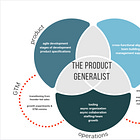What’s the difference between a sales specialist and a sales generalist?
The fourth in a new hWD series on generalist vs. specialist hires. This week? Sales.
As founder-led sales begin to wane, hiring for your sales team becomes the next big line item on the budget to increase revenue after gaining ground on product market fit. Depending on the makeup of your team, and the relationships and connections you may have developed in your career, your first sales hire or two will either be more specialized or generalized.
Reframing sales in the early days
It's important to understand PMF and where your company is on that journey to truly understand the type of sales support you need at each stage of growth. An early-stage startup can only get to a true selling motion when it’s on a path to repeatability. First Round Review recently shared a framework for thinking about PMF in 4 distinct levels; nascent, developing, strong, and extreme. When in the nascent stages, you have a handful of happy and engaged customers, but things feel messy and unstructured. At this stage, you’re still figuring out what you need, and how to drive more value in your product. A sales specialist might get stuck in this stage with what you're selling often changing and shifting as you learn. In the developing stages, you have more engaged customers and less churn, and you need to work on driving demand. A sales generalist may start to lose steam as you gain repeatability and identify patterns that allow specialists to thrive going in a singular direction. “Repeatability is the holy grail on the hunt for product-market fit. Without any patterns, it’s nearly impossible to generate early momentum and plot a course forward.”
The Sales Specialist
More traditionally, a sales specialist is a Sales Representative focused on building a consistent and repeatable approach to find leads, generate demand, and close paying customers. Compared to generalists, however, a sales specialist can be a sales professional with deep knowledge of a specific niche and the science of selling in a specific vertical (B2B, B2C, etc). They’ll have sales roles and iterations (SDR, Account Manager, Senior Account Manager, Director of Sales, etc) in a fairly linear trajectory on their resume, with a focus on exceeding quota and getting to the next stage of their field through persistence and traditional sales tactics.
The Sales Generalist
A Sales Generalist is a sales professional with experience in functions adjacent to sales and the ability to take a prospect deeply into the customer journey by drawing on their ops knowledge.
… with experience in functions adjacent to sales: A sales generalist may have a background in partnerships, customer success, customer support, marketing, or even product. Their ability to understand other functions well allows them to elicit support from their fellow team members to respond to prospect questions and needs, while also leveraging skills beyond prospecting and negotiating to enhance their ability to close deals.
… with the ability to take the prospect deeply into customer motions: Sales generalists will have the project management skills to successfully take a contract through, setting the framework for account management with an eye on customer success.
with ops chops. A great sales generalist knows enough rev ops to be dangerous, building and maintaining internal systems that are early yet important, automating workflows, leveraging AI, and leading repeatable processes for maximum effectiveness.
who You Need
As with all hiring, there is no one-size-fits-all person that works well across every team and founding team makeup. However, early-stage founders can leverage two approaches:
The Specialist First: For teams that have founder-led sales down pat with a marketer already positioned on the team and some additional customer support team members to round out the org, a traditional sales specialist with deep experience in closing leads can be the missing piece to transition from founder-led sales to a more repeatable sales machine.
The Generalist First: When your team is made up of only founders and engineers and you’re keen on bringing in sales, the generalist will own the sales process to close prospects while also setting up your systems the right way right away so you don’t feel the pain of a CRM full of messy and unorganized data when you’re scaling and need to forecast appropriately.
If you can have it all…
Sales teams work better as more than one. As a first hire, choosing wisely can take you to the next stages of PMF well, but as you grow, having the ideal ratio is important. While you’ll likely grow out of the type of sales generalist outlined here, before you do, keeping a healthy mix of more traditional sales generalists (or account managers) is ideal to maximize ROI. Mark Kovak at Bain found that “a 1:4 ratio of specialists to account managers generated the highest profitability for the tech company. In accounts where there were fewer specialists, the company was foregoing profits and could add specialists. And where there were more specialists, they didn’t pay for themselves, diluting profitability. This dynamic applied companywide, by territory, and by product category.”
TLDR
You can assess the need for your early org in how each profile approaches their work, measures impact, and solves problems.
Approaching Work
The Specialist: A specialist approaches work with a singular mission, focused on leveraging the relationships they have and their deep domain expertise to drive consistent results.
The Generalist: The generalist approaches work by “building the plane while flying it”. They’ll execute toward closing deals while building systems and nurturing customers in the process.
Measuring Impact
The Specialist: A specialist measures the impact by # of closed deals and the size of those deals. Top-line revenue is their bottom line.
The Generalist: The generalist, as with any sales role, is equally measured by their ability to close deals, but also by how well they’ve nurtured that relationship for repeat future business, as well as created and maintained systems for others to use in the future.
Solving Problems
The Specialist: The specialist is focused on the hunt and the close, laser-focused on finding the right prospects and getting a deal signed.
The Generalist: The generalist can leverage cross-functional expertise to better understand what might not be working if deals aren’t closing, and come up with systemic solutions rather than discounts or other sales tactics to improve closing velocity.
Before you go
Whether opting for specialists or generalists when you start, remember that there's no one-size-fits-all approach. Early-stage founders can strategically leverage specialized expertise or versatile skill sets, based on their team dynamics and objectives. Whether prioritizing specialists or generalists initially, the ultimate goal remains the same: optimizing your sales force to propel your venture forward. As as your company evolves, maintaining a balanced mix of specialized and generalist roles can drive maximum ROI, ensuring profitability and sustained growth.
Writer: Britt







